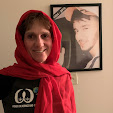



Dear Friends,
Yesterday I went on a hike in gorgeous Wadi Qana. I mentioned earlier that IWPS will be participating in a nonviolent campaign to defend Wadi Qana which is being organized by the PPP (Palestinian's People Party). Our friend and PPP member, Riziq, was our guide.
Wadi Qana is a breathtaking fertile valley with over a dozen natural springs and the Wadi Qana river running through it. It may very well be one of the most beautiful places in Palestine. It was certainly once one of the most fertile in the West Bank, producing olives, figs, plums, almonds, and a variety of citrus fruits. But it has been severely degraded environmentally by sewage from the surrounding Israeli settlements, which now number eight.
Wadi Qana is also the name of a village that was emptied of its inhabitants because life became simply intolerable. Its former residents now live in Riziq’s village of Deir Istiya, immediately north of Hares in the Salfit Governate. Salfit has the distinction of being the only governate in Palestine where the settler population and Palestinian population are roughly equal. This is due to high density of settlements, including Ariel, one of the largest settlements with a population of roughly 30,000.
Besides pollution, Palestinians must deal with other factors harming their land or preventing access to it. Settlers have often raided the land in the valley, uprooted trees, damaged and destroyed irrigation systems, greenhouses, and especially expensive water pumps. Palestinian farmers cannot even prevent land damage caused by wild pigs that locals say were introduced by settlers: villagers are unable to kill or use traps to control the pigs as it would fall under the prohibition of Palestinians to possess weapons.
The construction of settler roads, which Palestinians are not allowed to use, has not only confiscated some of the land but has also prevented access to it. Once, the mayor of Deir Istiya managed to build an alternate road to Wadi Qana, supported by the Palestinian Agricultural Relief Committees (PARC), however, in 2001 the outpost Doron Yaqir was built and blocked this new road as well.
In the Oslo Accords of 1993 Wadi Qana was made a nature reserve. It is now prohibited to ''change the natural character'' of the region, meaning that Palestinian landowners are not allowed to plant new trees. In May of this year, Israeli conservation authority workers uprooted over 100 olive trees planted by Riziq and other farmers from Deir Istiya. The trees were not destroyed, but removed in vehicles.
Four days after this incident, two youth picking sage in a wooded area of Wadi Qana were arrested and taken to nearby Qedumim settlement, where they had to promise not to pick sage again before being released.
On our walk we ran into another hiker, a settler. The customary greetings that hikers exchange as they pass each other were conspicuously omitted.
Love,
Wendy

1 comment:
Wadi Qana is really beautiful !
I'm Palestinian, but I never had the opportunity to go there!
I'm currently creating a blog and scrapbook of beautiful places in Palestine , and I would like to use some of the pics you have here, after your permission ofcourse :)
Post a Comment